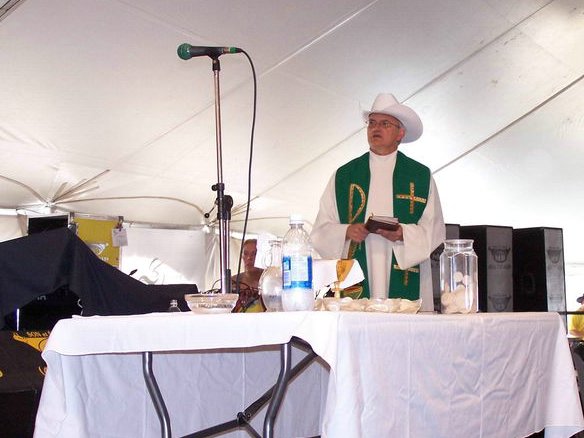 "To remember is to live," as the Spanish say, and what better day than today to remember the words of Archbishop Piero Marini, President of the Pontifical Committee for International Eucharistic Congresses and former Master of Pontifical Liturgical Ceremonies, in his famous 2006 interview to Italian website Affari Italiani. At the time, Marini was promoting his new book, "Liturgy and Beauty", in the Catholic University of the Sacred Heart in Milan (the famous "Cattolica"). We published this translation, with pictures*, on March 21, 2006.
"To remember is to live," as the Spanish say, and what better day than today to remember the words of Archbishop Piero Marini, President of the Pontifical Committee for International Eucharistic Congresses and former Master of Pontifical Liturgical Ceremonies, in his famous 2006 interview to Italian website Affari Italiani. At the time, Marini was promoting his new book, "Liturgy and Beauty", in the Catholic University of the Sacred Heart in Milan (the famous "Cattolica"). We published this translation, with pictures*, on March 21, 2006....
Archbishop Marini, after the Council, the liturgical reform cost a schism, that of Archbishop Marcel Lefebvre. What do you make of it?
"After every Council, there has always been a period of tension. There is always someone who does not agree or who does not approve that which has been done. Well, the fact is that we do not have policemen to order the faithful to accept that which the Second Vatican Council has decided [laughter]."
And then?
"And then we must, first of all, understand that the liturgy is a sign of unity and that, as Pope Paul VI said: 'The Church is not that of the past or of the future, but of the present, for which we must accept the Church living today. That is not a question of liberalizing the Missal or something else, it is just a question of accepting the Church of today, period. To be clear, I refer to the history of the Tridentine rite".
Yes...
"The Tridentine rite or that of Saint Pius V, which in reality is the Missale Romanum aggiornato according to the last dispositions of 1962 by the work of John XXIII, was left in place under certain conditions to avoid a traumatic passage from the old rite to the new for the older faithful. Afterwards, pope Wojtyla allowed that, in certain churches, the rite of Saint Pius V could be celebrated. But to walk beyond this is to walk beyond the Church, and that cannot be done. If the liturgy is a sign of unity for the Church, I cannot establish groups of faithful who at a certain day and at a certain time pray in one way, then another group who in another time pray otherwise. And then we come to the Lefebvrists"
Yes, we come to them. What do you think of them?
"It must be clear once and for all: they must accept what the Second Vatican Council has decided, otherwise no reconciliation will be possible. And then, what do these people want? The majority of the faithful has adapted itself; without the new rite, which was not a child of the Curia but a work of international inspiration, the celebrations and foreign trips of pope Wojtyla would have been impossible to make. Now, because they cannot adapt, what is the difference? I wish to tell you a story"
Please...
"Some years ago, they came to greet me and I received them. One of them spoke and said: 'Your Excelency, the new rite is a heresy.' 'Why?,' I asked: 'because -- that Lefebvrist told me -- 'in the old rite the celebrant kneeled, worship the Host, lifted himself, showed it to the faithful and then kneeled again to worship it.' 'Ah -- said I -- and now?' 'And now this is a heresy because the celebrant only kneels after the ostension, in reality asking first for the consentment of the community before proceeding to the consecration.'"
And then what did you do?
"What did I do? Well, we simply wished to abolish a duplicate and he talks to me about heresy? 'Here, this is my phone number,' I told him, 'when you have a need, call me'."
In your words, while you presented the book, I felt a certain nostalgia for the past. [Nostalgia] for what?
"Yes, at times I feel so nostalgic. Because at the time in which the liturgical reform was effected I was only 23, for which I saw the last three months of the Council, but this is part of my feelings. However, in a historical point of view, we had at the time a distant objective, the complete reform of the liturgy, which we wished to accomplish. We have worked through the perspective of the renewal and of the return to the Church of the Holy Fathers, eliminating every crust of time from the Roman liturgy. However, the enthusiasm has had some degenerations..."
Of what kind?
"I think that in Belgium and in the Netherlands, on the wave of experimentalism, more than 300 eucharistic prayers were created, then it slowly returned to normality. But I fear this, the return of neoritualism, that is, of the priest who celebrates Mass thinking: 'Well, I have said my Mass following the rite by the book, I am done.' And that is not good, the celebration is not only a passive respect for the liturgical rules, there is always some space for the celebrant."Antonino D'Anna
___________________________________
*We thank Catholic Church Conservation for several of the pictures.
*We thank Catholic Church Conservation for several of the pictures.





